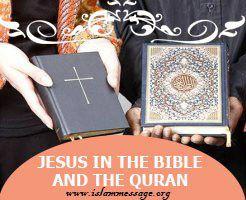Jesus in the Bible and the Quran


Jesus in the Bible and the Quran
Jesus in the Bible and the Quran
Many Christians and Jews are amazed when they learn that numerous stories and figures they know from their own sacred texts can also be found in the Quran and the authentic traditions of Prophet Muhammad.
In all the sacred texts stories are designed to teach us lessons and demonstrate the power of God. They also show us that humankind continues to face the same dilemmas that were faced in Biblical times.
In the following four articles we will take Biblical figures found in the Quran and add another dimension to the stories found in the Biblical texts.
Jesus in the Quran
Chapter Three of the Quran is called The Family of Imran. It is a chapter dedicated to Jesus and his family. The Imran mentioned is Jesus’ grandfather, the father of his mother Mary. Several chapters of Quran tell the same stories that Christians are familiar with about the life of Jesus, the Messiah.
However they add more depth to all the stories and the people in them. It is as if they have taken the stories in the Bible and filled in some of the missing details.
This is not surprising because in the third verse of this third chapter God says that He has sent down the book (the Quran) confirming what came before it; the Torah and the Injeel (Gospels). Many Christians are attracted to Islam because it offers the answers to many of the questions that have been puzzling them.
Muslims are required to believe equally in all the prophets of God, and to believe in all the revelations, in so far as they agree with the Quran. If there are discrepancies it is because the versions of the Bible (Torah and Injeel) that we read today have been altered, mistranslated or lost.
Jesus is an important figure in Islam. The big and insurmountable difference between Jesus in Islam and Jesus in Christianity is the fact that in Islam Jesus is a human being, a man, no more and no less. He is a prophet and messenger from God, he is not a god nor does he have any godlike qualities or attributes. However that does not mean that he is not special.
Jesus’ Miracles
Jesus’ life is filled with miracles. In some he is the recipient of the miraculous power of God and in others he performs miracles by the will and with the permission of God.
Chapter five of the Quran, The Table Spread with Food, also deals extensively with information about Jesus and his followers. The table spread with food refers to a meal enjoyed by Jesus and the disciples. They asked Jesus to request that God to send down a table spread with food. As if to demonstrate Jesus’ status God fulfilled his request. This meal was to be a recurring commemoration for them and it is likely that it was the meal Christians refer to as the Last Supper.
Chapter five also contains a lengthy verse in which God asks Jesus (and us) to remember the favors and bounties God bestowed upon him and his mother. (Quran 5: 110)
As an infant Jesus spoke to the people surrounding and berating his mother. When questioned about her disappearance and then reappearance with a baby in arms, Mary bore their criticism and directed their questions to the child. “How can a small baby speak to us?” they asked. It was a miracle.
Babies do not speak, but Jesus spoke clearly and succinctly.
I am the slave of God; he has given me a scripture and made me a prophet. He has blessed me and made me not arrogant and I am dutiful to my mother. God has asked me to pray and give charity, and peace is upon me all the days of my life.
The full text of the baby Jesus’ words can be found in yet another chapter of Quran dedicated to Jesus and his family; Chapter 19, named after his mother Mary.
His Childhood
The Bible is silent about Jesus’ childhood. After his birth we are left to wonder about his life until we find him in the temple around the age of twelve. Islam provides us with a snapshot of his childhood.
The Quran tells us that the child Jesus had made a small bird out of clay. He held it in his hands and breathed into and behold it was a living bird that fluttered into the air. This was a miracle performed by Jesus with the permission of God.
When Jesus grew up and began to teaching he gathered many followers due to the miracles he performed.
Both Quran and the Bible tell us about healing lepers, curing the blind and raising the dead. God allowed Jesus to perform these miracles in order to convince the disbelievers that he was certainly sent to them by God. Jesus did not represent himself as divine and in both books he goes to great lengths to disprove their false beliefs.
The Messenger of God
During his time on earth, Jesus faced the same joys and tribulations faced by all members of the human race. He questioned the purpose of his life, he pondered the forces of nature, and he perceived the signs and evidences of God.
Jesus grew in knowledge and as he moved into the days of his Prophethood he encountered the same hardships that all of the Prophets and Messengers of God faced. He worked long and hard to deliver his message, that there is only One God, yet he was disbelieved and betrayed by many of his own people.
God performed a miracle when he restrained the Children of Israel (Jews) from killing Jesus. God says in Quran that they were resolved to kill Jesus even though he came to them with clear proof (of his prophethood). Jesus was not killed nor was he crucified, although it was made to look as if he was crucified. Instead God raised him to the heavens.
Jesus was an example of the Quranic verse (Chapter 10 verse 107) where we are told that if God wishes the person good there is nothing that can take away those favors or blessings. The children of Israel and the Romans were intent on doing harm to Jesus, they wanted to take the life of one of God’s chosen messengers but God did not allow that to happen.
His Return
Jesus’ role in the worldly life would not come to an end in that place, or in that time. The method He used to prevent Jesus’ death by crucifixion is often a topic of debate by Muslim scholars but the fact that God took Jesus up to Himself is not ever questioned.
Jesus will return to earth towards the end of time and Islam considers his return one of the signs that the Day of Resurrection is approaching. Various incidents throughout Jesus’ life demonstrate God omnipotent power.
Jesus’ life is covered by Quran and the authentic stories and traditions from the life of Prophet Muhammad. We are able to learn little details that deny Jesus’ divinity but at the same time make him more accessible to people who were unsatisfied with the trinity doctrine.
Come to a Word That is Just
Ethiopia is a country that most of us know very little about.
You might recognize the name but do you know that it is one of the countries in the region known as the Horn of Africa?
It is the second most populous nation in Africa and frequently in the grip of severe famine.
The region that we now call Ethiopia was once, in English, and most commonly outside Ethiopia, known as Abyssinia.
It was also previously known as the Kingdom of Axum, and named by Mani (216–276 CE) [1] as one of the four great powers of his time along with Persia, Rome, and China.
Axum remained a strong empire and trading power until the rise of Islam in the 7th century. However, unlike the relations between the Islamic powers and Christian Europe, Axum was on good terms with its Islamic neighbors. For Muslims, Ethiopia is synonymous with freedom from persecution and fear.
In the early years of Islam the Muslims were persecuted and tortured by the ruling families of Makkah. There were even instances of people mistreating members of their own families. Among the new converts to Islam were the poor and weak who were unable to put up with pain and hunger they were forced to endure.
In order to protect them and their new found religion Prophet Muhammad sent approx 80 people, including one of his own daughters, to Ethiopia. This event is known as the first Hijrah (migration).
Prophet Muhammad’s Letter
The King of Ethiopia, sometimes known as the Negus and possibly one of the last rulers of the Axum Empire, was known as a just and truthful man. He was a Christian with deep religious convictions.
Prophet Muhammad believed that his followers would be well looked after if they migrated to a country whose religion was Christianity, a scriptural religion whose Prophet was Jesus son of Mary. The migrants set off on their hazardous journey carrying with them a letter of introduction for the King. What follows is a translation of that letter:
“I begin with the Name of God, the Most Merciful, Most Gracious, From Muhammad, the Messenger of God to the Negus Al-Asham, king of Abyssinia (Ethiopia).
Peace be upon you, I praise God and I bear witness that Jesus, son of Mary, is the slave of God. He was created by the command of God and Mary the virgin, the good, the pure, conceived Jesus. As God created Adam, He created Jesus. I call you to God, the Unique without partner, and to His obedience, and to follow me and believe in that which came to me, for I am the Messenger of God.
I send to you my cousin Jafar with a number of Muslims, and when they come, I ask you to entertain and receive them. Peace be upon all those who follow True Guidance.”
When the rulers of Makkah heard about the migration they hastened to send their own emissaries to the Ethiopian court. It was their fear that if such a ruler welcomed the Muslims it would give credence to the new religion and legitimize their beliefs.
They planned to convince the King to expel the Muslims by giving him gifts, and by spreading gossip and slander about the new religion and the immigrants. However the King was a wise, noble and just man and was prepared to meet and hear both groups.
The two Makkan delegates reiterated their accusations. They said:
“Your Majesty, you well know that a group of fools have turned renegade and have taken asylum in your country. They did not embrace your religion, but rather invented their own religion that neither of us knows. We are people of high rank who are related to their fathers, uncles, and tribes, and ask that you would surrender these wretched renegades to us.”
Jafar’s Speech
The King then asked the group of Muslims why they had chosen this new religion rather than adhere to the religion of their forefathers or embrace the established religion of Christianity.
Jafar, the son of Abu Talib and thus Prophet Muhammad’s cousin, rose to speak on behalf of the immigrants and Islam. He said:
“O your Majesty, we used to be a people of ignorance. We worshiped idols, ate dead animals, committed great sins, severed family relations, and the strong among us abused the weak. We were like that until God sent from among us a Prophet who was known for his noble descent, honesty, trustworthiness, and decency.
He invited us to worship God alone and abstain from worshiping stones and idols. He ordered us to speak nothing but the truth and to render back our trusts to those to whom they are due. Moreover, he ordered us to keep our ties of kinship intact, be good to our neighbors, and abstain from what is forbidden.
He also ordered us not to commit evil, nor to say false statements, nor to eat up the property of orphans, nor to accuse chaste women of wrong-doing without proof or witness. He has commanded us to worship God alone and not to associate anything with Him and to pray, give Zakat and fast.
Hence, we believed in him and in God’s message to him. We worshiped God alone. We rejected that which we used to associate with Him as His partners. We consider unlawful what he has told us is unlawful and lawful what he has told us is lawful.
For this reason alone our people have attacked us, tortured us and forced us from our religion. They intend to make us revert to the worship of idols instead of praising God. They want us to consider lawful the evil actions which we used to do in the past.
When they tortured us and hemmed us in, and came between us and our religion, we left for your kingdom, choosing you because we need your protection. We hope that we would be treated fairly while we are with you, O King!”
The King listened to this exchange with patience and attention, when both the Makkans and the Muslims had spoken he turned to Jafar and said:
“Do you have with you anything sent down from God to your Prophet?”
What happened next caused both the King and his bishops to weep until their beards were soaked with tears, as detailed in Part 2.
______________
[1] Mani is the founder of Manichaeism, a gnostic religion of late antiquity which was once widespread but is now extinct.
Good is (the reward) for those who do good in this world, and God’s earth is spacious so if you cannot worship God at a place, then go to another… (Quran 39:10)
Muslims will often say to those of the Christian faith, “We love Jesus too”. Muslims have a deep affection for Prophet Jesus as they do for all of God’s prophets.
This point became obvious to the King of Ethiopia and it caused the King, his priests, and possibly others at his court to understand how close the two religions, Islam and Christianity, are.
…and you will find the nearest in love to the believers (Muslims) those who say: “We are Christians.” That is because amongst them are priests and monks, and they are not arrogant (they do not reject the truth). (5:82)
Let us revisit what we learned in Part 1. In the fourth year of prophethood, God’s messenger Muhammad sent a small band of Muslims to Ethiopia. Among them were the weakest converts to the new religion.
Prophet Muhammad believed that the King of Ethiopia, being a devout Christian, would give his people sanctuary and treat them with compassion. The Makkan leaders however refused to let the new Muslims find relief and hastened to send their own emissaries to slander and defame them.
The King, who was wise and just, made sure he heard both sides of the debate. When each side had stated their case he asked to hear something of the recitation sent down from God.
The Quran on Mary
Jaafar recited the opening verses of Chapter 19 of the Quran, called Maryam in honor of the mother of Jesus. The following is a small portion of Maryam.
(The angel) said: “I am only a messenger from your Lord, (to announce) to you the gift of a righteous son.” She said: “How can I have a son, when no man has touched me, nor am I unchaste?” He said: “So it will be, your Lord said: ‘That is easy for Me (God): And We wish to appoint him as a sign to mankind and a mercy from Us (God), and it is a matter already decreed.’ So she conceived him, and she withdrew with him to a far place (i.e. Bethlehem valley) (19:19-22)
The King and those with him were moved to tears. Silent tears rolled down their cheeks and soaked into their beards. The sublime words of Quran melted their hearts, as it had already begun to do in Makkah.
Interestingly most of the people at the Ethiopian court would not have understood Arabic, yet the eloquence and subtly of Quran moved them. The words were then translated for them. At this point in the story it is fascinating to realize that God described the Christians as those whose tears overflow when they hear the truth.
And when they who call themselves Christians listen to what has been sent down to the Messenger, you see their eyes overflowing with tears because of the truth they have recognized. They say: “Our Lord! We believe; so write us down among the witnesses. (5:83)
The Same Source
The King was overcome, and exclaimed, “It appears that these words and those that were revealed to Jesus are from the same source.” Turning to the Mekkan envoys he said, “I will not hand these refugees over to you. They are free to live and worship as they please under my protection.”
This did not please or satisfy the Mekkans. Their mission was to discredit the Muslims and thus the religion of Islam. The Mekkans moved forward with another plan to destroy the fledging religion, in a pathetic attempt to influence the King they declared that the Muslims spoke disrespectfully about Jesus.
After hearing Quran, it is unlikely that the King gave their assertion very much credit, however he called the Muslims back into his presence and asked about their belief in Jesus. Jaafar answered truthfully and immediately. “Our belief in Jesus relies on what our Prophet has told us about him; Jesus is God’s servant and messenger who was created by the command of God.”
On hearing this, the King declared that this description of Jesus did not differ from their own Christian belief. The result was that the Makkans left Ethiopia in disgrace, while the Muslims lived in peace and security for several years before they returned to Makkah.
| The letter Prophet Muhammad sent to the King of Ethiopia |
The Prophet’s Letter to the King
Several years later Prophet Muhammad wrote letters to different rulers throughout the world inviting them to accept Islam as their religion. Among the first leaders to receive the letter was the King of Ethiopia. What follows is an approximate translation of that letter.
“I begin with the Name of God, the Most Merciful, the Most Gracious. From Muhammad, the Messenger of God, to the King of Ethiopia.
Peace is for the one who follows the right guidance and believes in God and His Messenger. I bear witness that there is no god worthy of worship but Allah. He is one and has no partners. He has neither wife nor child. And Muhammad is His slave and His Messenger.
I call you to accept Islam. I call both you and your army towards Allah, Who is worthy of all respect and esteem. I have thus discharged my duty of conveying His message and advice. You should accept it, May peace be on the followers of the guidance.”
O people of the Scripture (Jews and Christians): come to a word that is just between us and you, that we worship none but God (alone), and that we associate no partners with Him, and that none of us shall take others as lords besides God. (3:64)
The Reply
The king received the letter with great respect and he accepted Islam, despite the objection of his family and the Church. He replied to the letter saying,
“O Prophet of God, I had the honor of seeing your esteemed letter. I swear by the God, that Jesus is nothing more than what you have described. I bear evidence that you are a true Prophet of God and I have taken an oath of allegiance to God and His prophet.) If you will so order, I will present myself to you. May peace and blessings of God be upon you.”
We place great credence in this final chapter of the story of the King of Ethiopia because when it was revealed to the Prophet that the King, whom he had never met, had passed away, the Prophet offered the first funeral prayer in absentia for him.
The story of the King of Ethiopia is a small snapshot in time. It teaches us about the manners and diplomacy between Prophet Muhammad and the noble rulers of the time. It shines a light on the closeness of the two religions, Christianity and Islam.
Prophet Muhammad knew that truly pious Christians were, and still are, but a step away from the religion of Islam. The eloquence of Quran is able to penetrate the hearts of whomever God chooses to guide. And the religion of Islam is open to all, king or commoner, rich or poor, black or white.



